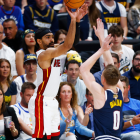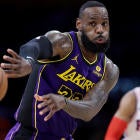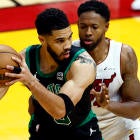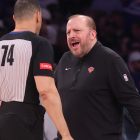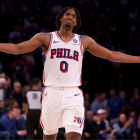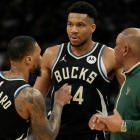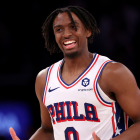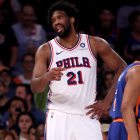
The Miami Heat are the embodiment of the idea that the NBA is a "make or miss league." The Heat snuck into the postseason despite having a negative regular-season point-differential, and their struggles largely came on the offensive end. The Heat ranked 27th in the NBA in regular-season 3-point percentage at 34.4%, and when they hovered around 33% in their two play-in games, it didn't look as though their stay in the postseason would last very long.
And then the switch flipped. They shot 45% in the first round against the Bucks and 43.4% in the Eastern Conference finals against the Celtics. Miami had as many 50% 3-point shooting games in the Eastern Conference finals alone (three) as it did in the entire regular season.
Miami is a better shooting team than its regular-season numbers suggested, especially considering its No. 1 ranking in 3-point percentage during the 2021-22 regular season, but numbers like that are preposterous. Sometimes, players just make shots that they typically wouldn't. Shooting luck is rarely a satisfying explanation for a series of upsets, but the truth of most sports is that luck plays a significantly bigger role in outcomes than fans want to believe. Miami's postseason success has, in part, been fueled by unsustainable shooting. The Heat are making more shots than the numbers suggest that they should.
But to some extent, it is the responsibility of the defenses facing the Heat to limit their access to shooting luck by taking the shots they seek out of the equation. The Denver Nuggets didn't do that in Game 2 of the NBA Finals. While the Heat probably can't expect to shoot 17 of 35 from deep too many more times in the series, the Nuggets lost this game in part because they gave the Heat the sort of open looks they needed to rack up those triples. The Nuggets, in short, played poor defense, and it was felt most acutely from behind the 3-point line.
Their worst offense? Consistent miscommunication. Far too many Heat shots simply boiled down to two Nuggets being where only one Nugget needed to be. That is essentially what happened on this play. Max Strus sets a ghost screen for Gabe Vincent, and Kentavious Caldwell-Pope switches onto him. Michael Porter Jr. doesn't follow Strus, and the Heat get a wide-open look.
Without knowing the exact game-plan, it's possible that Denver planned to send two defenders to the ball on screens, but if that's the case, someone needs to be ready to rotate into the corner. Nobody does. The same thing happens a few possessions later, when Strus sets a ghost screen for Jimmy Butler. Murray picks up Butler, but Gordon sticks with him, and nobody rotates over to Strus.
These mistakes become far more damaging in the fourth quarter, when points are at a premium. Miami's first lead of the second half came when Christian Braun and Bruce Brown both followed Duncan Robinson around a pindown screen, leaving Vincent, the screener, free for a 3-pointer of his own.
When the Nuggets made mistakes like this, they frequently overcompensated by recklessly selling out on closeouts to try to stop 3-pointers. When this happened, they'd fly by shooters and take themselves out of the play. When Jeff Green is slow to realize that Caldwell-Pope has rotated into the corner and that he needs to jump onto an open Kevin Love, Love calmly fakes him out of the play before sinking a clean look in front of him.
Jamal Murray didn't even need to close out so aggressively to contest this Duncan Robinson look. He just overplayed it.
The Nuggets frequently found themselves in these positions because their game-plan revolved around taking away the rim. They largely succeeded on that front, holding Miami to just 34 points in the paint. But as the Heat have proven all postseason, they're going to make the open looks that you give them. So when Caldwell-Pope decides to provide rim help against Butler, the open 3 that Vincent drills in response feels almost inevitable.
This is the challenge of playing Finals-caliber defense. Winning championships typically means taking away an opponent's greatest weapons without sacrificing too much in response. That means playing 24 seconds of disciplined, five-man defense. That's what makes a possession like this so frustrating. Denver succeeded defensively for the first 20 seconds or so of the shot-clock. They've simply devoted too many resources to protecting the rim. So when Butler kicks the ball back out to Vincent, he's wide open. Even if someone had managed to scamper their way over to him, Strus was just as open on the other wing.
The Nuggets have inherent defensive vulnerabilities based on their personnel. There are certain schemes that they simply can't run against high-level opponents because Nikola Jokic is not mobile enough. Plenty of Denver critics expected the Nuggets to get knocked out of the postseason by an opponent capable of exploiting that specific weakness.
But that isn't really what happened in Game 2. The Heat didn't generate open looks by exploiting inherent mismatches. The Nuggets allowed them by playing undisciplined defense.
Did that guarantee Miami's victory? Absolutely not. This is where shooting luck comes back into play. Sometimes teams win games by making contested looks. Sometimes they lose games by missing open ones. Miami has been on the right side of that equation more often than not this postseason.
But more importantly, they position themselves to take advantage of the opportunities presented to them. The Heat don't make undisciplined mistakes on defense. They rarely turn the ball over or play stagnant offense. Beating superior opponents becomes far easier when you allow them to beat themselves. Miami has done that all postseason. Even if their shooting is unsustainable, the underlying advantages Miami has are not. The Heat may have relied on some shooting luck to get here, but they position themselves to take advantage of it when it comes. From that perspective, they make their own luck.













